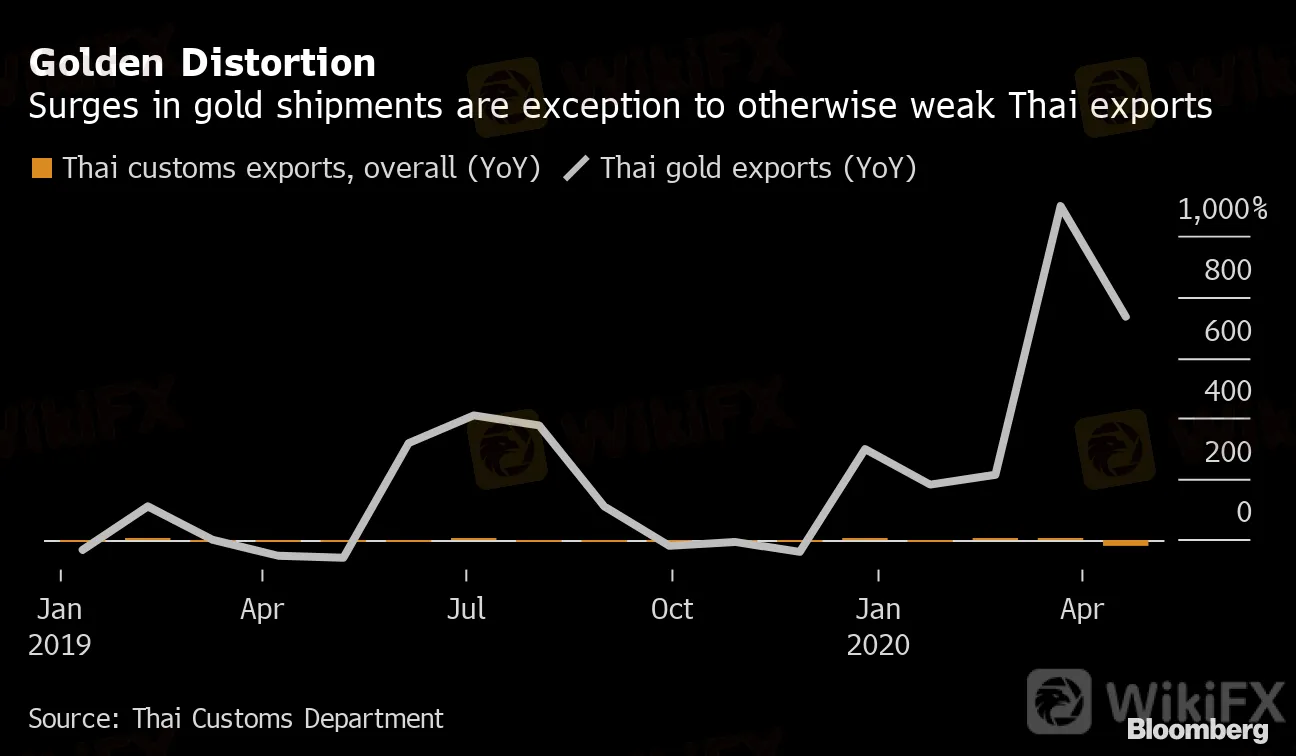简体中文
繁體中文
English
Pусский
日本語
ภาษาไทย
Tiếng Việt
Bahasa Indonesia
Español
हिन्दी
Filippiiniläinen
Français
Deutsch
Português
Türkçe
한국어
العربية
Thailands Gold Plan May Curb Baht Without Incurring U.S. Anger
Abstract:The Bank of Thailand‘s plan to sever the link between gold trading and the baht may be a way to limit the currency’s gains without incurring the wrath of the U.S. over foreign-exchange manipulation.
The Bank of Thailand‘s plan to sever the link between gold trading and the baht may be a way to limit the currency’s gains without incurring the wrath of the U.S. over foreign-exchange manipulation.
The Thai central bank says it‘s in talks with market participants about converting local gold trading to U.S. dollars, including futures, to reduce the baht’s strength. Policy makers have long complained the appreciating currency threatens to damage the countrys exports.
The baht fell at the start of the Covid-19 outbreak but has since gathered strength amid the gold fervor. The surge in the precious metal has convinced many Thais to cut their holdings, forcing local shops to sell in the international market. The step of exchanging dollars into baht as part of the process has been one of the factors helping the Thai currency gain about 5% from its March low.
Golden Distortion
Surges in gold shipments are exception to otherwise weak Thai exports
Source: Thai Customs Department

The baht has been the best-performing Asian currency over the past four years, appreciating about 10% against the dollar over the period. The currencys real effective exchange rates was at 111.4 at the end of June versus a 10-year moving average of 103.7, indicating it is overvalued, according to a gauge from the Bank for International Settlements.
The market for wholesale gold trading in baht is about $50 billion a year, or about 5% to 7% the size of of Thailands foreign-exchange market, according to figures from SCB Securities Co.
Read more: Bank of Thailand Closely Watching Impact of Gold Trading on Baht
UBS Group AG and ING Groep NV have both warned that Thailand is at risk of being added to the U.S. watchlist for currency manipulation for meeting the criteria set out by the Treasury Department. For its part, the Thai central bank has repeatedly said it doesnt influence the currency to gain an unfair competitive advantage.
“If the BOT went about with the traditional managed float, it would place it on the radar of the U.S. Treasury as a potential manipulator,” said Kobsidthi Silpachai, head of capital market research at Kasikornbank Pcl in Bangkok. “But to do nothing would equate to the continuation of the loss in the bahts competitiveness.”
Whether the gold-trading proposals are approved “depends on the willingness of the next BOT governor to experiment with non-conventional monetary measures,” Kobsidthi said. Thailand is in the process of selecting a new central bank chief for the term starting Oct. 1.
Gold Traders
Thailand‘s Gold Traders Association is studying details of the conversion plan and will see how it can comply, said Jitti Tangsithpakdi, president of the trade group. Thailand is the world’s ninth-largest gold exporter, despite not being a major producer, according to Kasikornbank.
The rule change “should help reduce baht volatility,” said Somprawin Manprasert, chief economist at Bank of Ayudhya Pcl in Bangkok. “But the baht will continue to appreciate in the long term even if our real sector is in pain,” he said, citing the countrys ample international reserves and current-account surplus.
The baht will strengthen to 30.75 per dollar this year and reach 30 at the end of 2021, Somprawin said. The currency was at 31.462 on Wednesday, according to data compiled by Bloomberg.
— With assistance by Michelle Jamrisko
Disclaimer:
The views in this article only represent the author's personal views, and do not constitute investment advice on this platform. This platform does not guarantee the accuracy, completeness and timeliness of the information in the article, and will not be liable for any loss caused by the use of or reliance on the information in the article.
WikiFX Broker
Latest News
CySEC Warns Against Unauthorized Investment Firms in Cyprus
Why Even the Highly Educated Fall Victim to Investment Scams?
Warning Against Globalmarketsbull & Cryptclubmarket
Dukascopy Bank Expands Trading Account Base Currencies
UK Sets Stage for Stablecoin Regulation and Staking Exemption
Axi Bids AUD 52M to Acquire Low-Cost Broker SelfWealth, Outbidding Competitor Bell Financial
Crypto Influencer's Body Found Months After Kidnapping
STARTRADER Issues Alerts on Fake Sites and Unauthorized Apps
Italy’s CONSOB Blocks Seven Unregistered Financial Websites
Bitfinex Hacker Ilya Lichtenstein Sentenced to 5 Years in Prison
Currency Calculator


